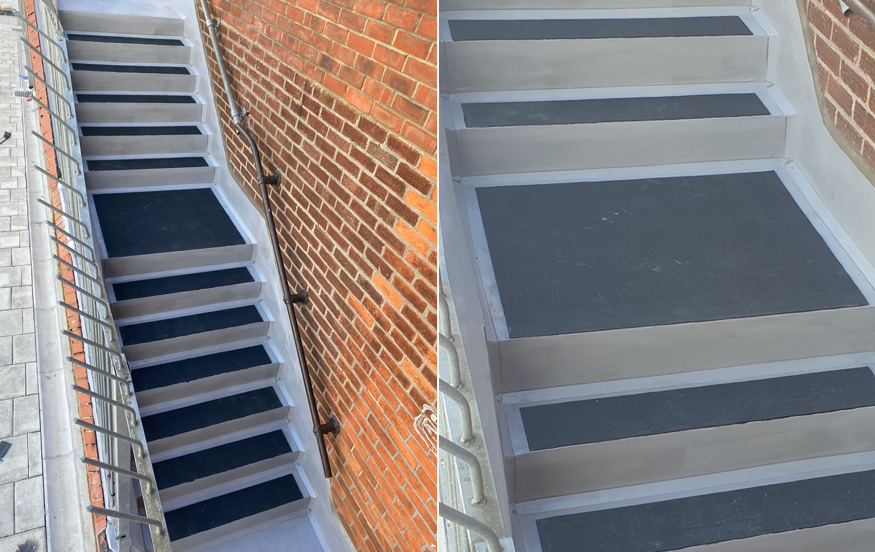Mastic asphalt is typically used for flat roofing applications but due to its waterproofing properties and durability, mastic asphalt is being specified more and more to protect exterior steps.
Member contractors of the Mastic Asphalt Council (MAC) are reporting increasing demand for the waterproofing of steps on both commercial and residential projects. In the case of residential properties, mastic asphalt is used to waterproof steps leading down to basement apartments or leading up to the front doors of Victorian townhouses which are amongst the most sought-after and highly priced properties in the UK today.
It is essential to keep steps and walkways completely waterproof in order to preserve the materials they are constructed from, to prevent structural defects, to prevent them from becoming a safety hazard and to enhance their overall appearance. Mastic asphalt is particularly popular on stone, concrete and fibreglass covered steps which are susceptible to deterioration over time, allowing water through into underlying areas and becoming dangerously slippery in the rain.
Waterproofing is carried out by highly skilled mastic asphalt operatives, applying the product to provide effective long-term waterproof protection, a smooth finish, non-slip properties and durability to withstand constant foot traffic.
Water ingress can prove to be extremely costly and disruptive and mastic asphalt has proven to be a highly effective solution for keeping commercial and residential properties dry and free from water penetration. Correctly applied, mastic asphalt steps will stand the test of time, lasting for up to 30 years.
MAC contractor member Howard Evans Roofing and Cladding has recently been involved in a refurbishment project at the Iceland frozen foods store in Bristol. The external fibreglass stairway is a busy communal area and was previously protected with multiple layers of coatings, but over time these had failed due to the high level of foot traffic.
The steps needed to be refurbished with a reliable waterproofing system as they had been causing major leaks. In fact, two of the aisles in the Iceland store needed to be closed, so the waterproofing need to be reinstated quickly and effectively.
Prior to the application of mastic asphalt, thorough preparatory work was carried out by the Howard Evans Roofing and Cladding site team. This involved the removal of three layers of previously applied coatings. The team then cut chases to the brickwork and primed all surfaces using a high bond primer.
Two coats of recreational grade mastic asphalt were then applied to all upstands and treads to provide a waterproof surface. Due to the heavy foot traffic, the steps were finished with a heritage grey solar reflective paint and road carpet treads to ensure longevity and provide an aesthetically pleasing finish.
Mastic asphalt was ideal for this project as it is malleable and workable around upstands without the formation of any voids, so the threat of water penetration is eradicated. The skilled work involves ensuring that asphalt is laid at the correct temperature, and then spreading it using traditional techniques to coat the surface. A thermoplastic material that changes shape when heated, mastic asphalt cures to form a hard, durable, finished product. The flowing characteristics of mastic asphalt make it possible for installing contractors to refurbish surfaces which are complex, stepped or with protrusions.
Luke Maginnis, Site Foreman at Howard Evans Roofing and Cladding, delivered the project at Iceland Bristol. Luke has delivered many impressive mastic asphalt projects, including the prestigious St Antony’s College project in Oxford which was winner of the Best Project Over 200m2 accolade at the MAC awards in 2021. St Antony’s College forms part of the University of Oxford and the mastic asphalt project involved a total roof refurbishment extending to over 1,800m2.
Repairing steps in busy communal areas can be a highly disruptive process, especially if the steps are not accessible for lengthy periods of time, but mastic asphalt is very quick and easy to apply. The installation process is fast, providing a completely waterproof surface and, if additional layers need to be applied, it is very easy to do so.
Whilst the Iceland store were delighted with the finished job which ensured no further disruption was incurred on the shop floor which had significantly impacted customer experience and trade, the biggest compliment came from the local postman who commented that the steps looked fantastic and more importantly, were safer to walk on. He sincerely thanked the Howard Evans Roofing and Cladding site team for their efforts.
Mastic asphalt can be trafficked within a few hours and it also has zero water content, which means there is no waiting for moisture to evaporate. It is well-known for being durable and long-lasting but specifiers and clients may be less familiar with its sustainable credentials.
Mastic asphalt is carbon neutral – a massive bonus for any building owner keen to show their green credentials and, when it has reached the end of its useful life, the product can be recycled or used as roof screed, minimising the impact on the environment. Over ten years ago
the mastic asphalt sector became the first industry in the world to achieve the CarbonZero standard.
This article featured within the April 2022 edition of RCi Magazine – click here to view the article.

